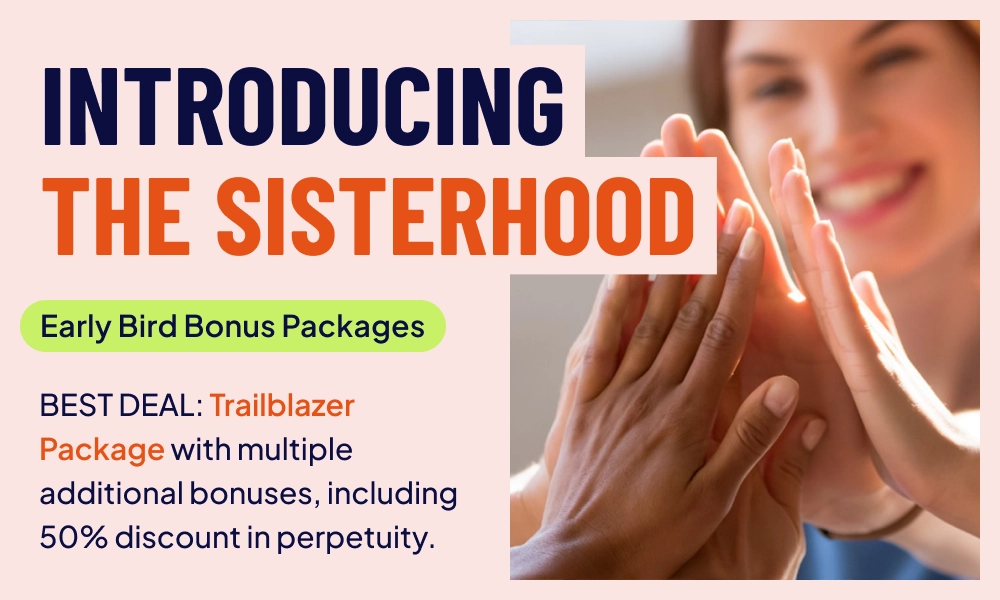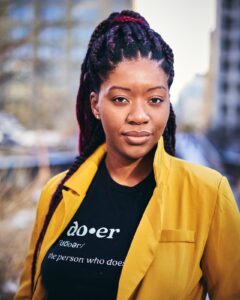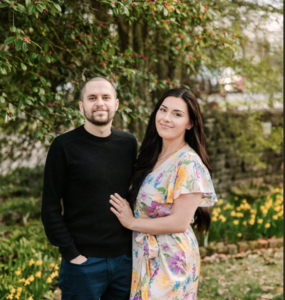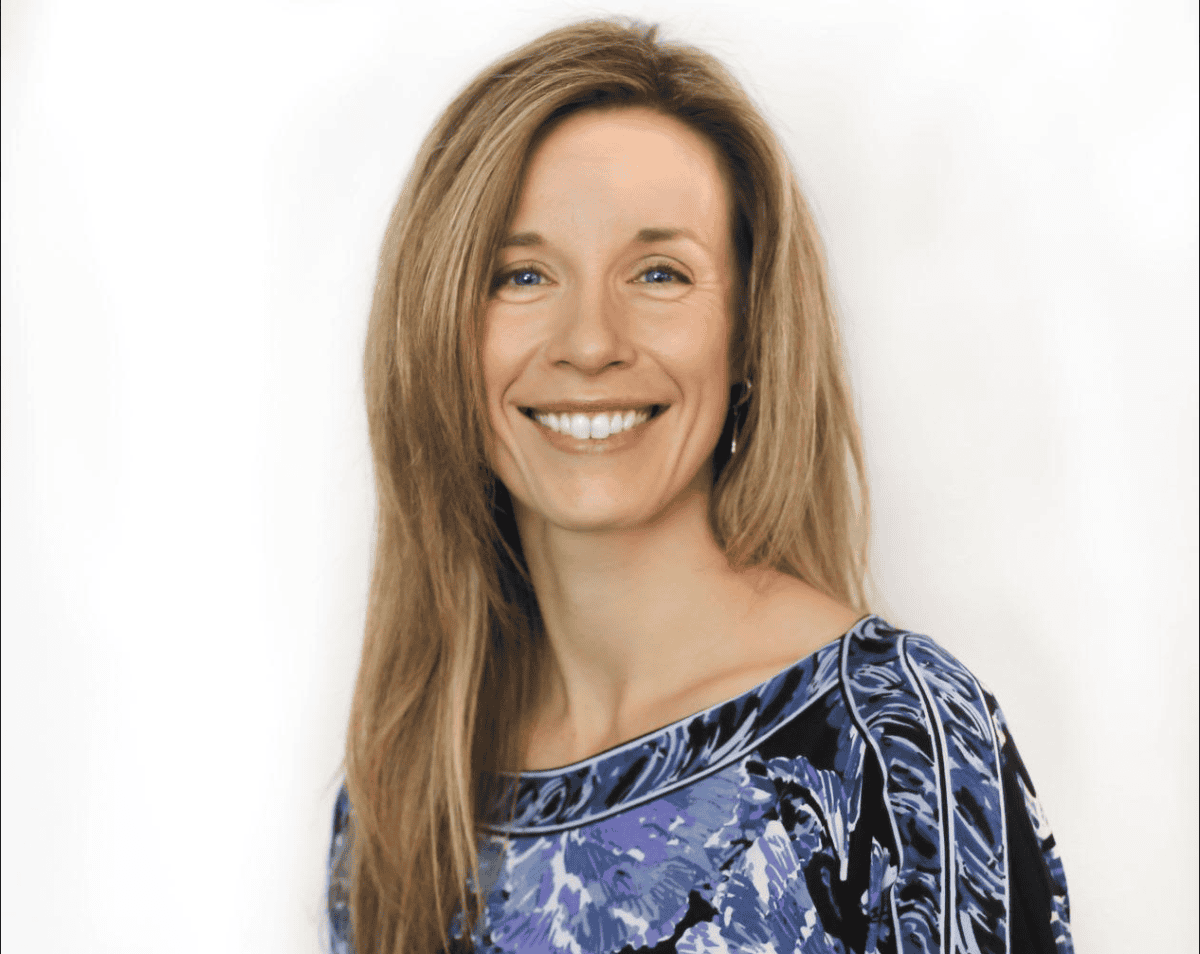Samantha Rauh is a passionate author, speaker, and spiritual life coach whose journey is shaped by resilience, faith, and a profound dedication to helping others. Drawing from her rich life experiences—including growing up alongside a sibling with disabilities, navigating the challenges of motherhood, and embracing her faith—Samantha brings authenticity and empathy to her work. Whether through her writing, public speaking, or one-on-one coaching, Samantha seeks to inspire others to embrace their authentic selves, overcome adversity, and find hope in the midst of life’s challenges. Her story is a testament to the transformative power of grace, connection, and perseverance.

What inspired you to become an author, speaker, and spiritual life coach?
Speaking is something my family has been trying to get me to stop doing since I was little. I have always been a talker. It wasn’t until age 14 that I began honing these skills for specific audiences. I started speaking competitively in high school and received a scholarship to continue in college. From the beginning I was taught by my coaches that there is no point in saying whatever, especially in front of an audience, if you do not care about it. It is only when you are passionate about a topic or subject that your authenticity will show through and connect you with your audience. That is what I look for as a judge in these tournaments, and what I teach as a coach.
Becoming an author came out of being a speaker. I write like I speak, which helped me as a Communications Major, but very much hindered me as a Seminarian. Therefore, over time I’ve had to adapt to many different writing styles, though my comfort lies in more of a narrative voice. I’ve always wanted to be a writer. Every day something comes to mind that I want to write about and I begin drafting in my head. However, it has not been something I have vocalized until recently.
My profession has been all over the place. An ongoing joke with former students of mine is that I have had every job imaginable: mine, book-keeper, waitress, professor…you name it, I have more likely done it. All the while I had these jobs, I was vocationally called to and working in ministry. For those in ministry, they can attest that sometimes you work more than one job to make a living. While I served in pastoral roles in churches, I quickly found out that being a pastor is not at all what I assumed it would be. My call to ministry is relational. Blessed be the ones who pour over budgets and spread sheets, that is not my gifting. Not only did I see that being a pastor in the majority of churches was administrative, it also could be very oppressive and painful as a woman. Even finding a church that is fully affirming of a woman in her call to ministry is difficult to find. With all of that being said, I have rotated around in the ministry world trying to find a place where I could serve fully without those continuously tearing me down. Due to life, I have ended up here: a Spiritual Life Coach. Someone who walks alongside people, hearing them, helping them identify goals, and ways to achieve them, and providing tools to help them grow-all the while staying alert to the Holy Spirit in their lives for discernment. I am in the process of getting my Spiritual Director Certification. As a Spiritual Director, it is more about finding and becoming our authentic selves (and then can better tackle goals on our own). Spiritual Life Coaching is giving me the opportunity to grow as a one-on-one coach so I can be more fully prepared as a Director in the future.
- Can you share more about the life events that have shaped your journey?
Life events that have shaped my journey. I feel like these are always the type of questions where people begin to trauma dump (I being one of those people). I have experienced a lot in my short 33 years, so I am going to try and limit them to my top five:
- My brother, Zach. Zach was born with a rare (though, research is finding that it is not as rare as once assumed) brain disorder called Agenesis Corpus Callosum. He is also on the spectrum and has a very long list of other disability diagnoses (physical, mental, developmental, etc.). He states the longer the list, the cooler you are, so…he’s pretty cool. Because of Zach I had to grow up very quickly and identify closely with Glass Child Syndrome. I have also grown up very involved with the disability community and am passionate about full inclusion and access. With that being said, I am not perfect and the more I lean into advocacy, the more I realize I have a lot to learn.
- The Forensics (Speech) Team. I cannot think of one thing in my life that has not been impacted by being a part of speech. I have been a part of the community going on 20 years now, and I don’t know what I would be doing had I not done that activity.
- Meeting and marrying my husband, Justin. He is my best friend in the whole world and I still can’t believe it is real life that we found each other. I always thought I would have to change everything about me in order to be loved…and he loves me as I am. We have been through so much together in such a short amount of time, which has made us grow closer. He really is my favorite weirdo I get to have a forever sleepover with, and it’s awesome.
- Our daughter, Lucy. I always knew in the back of my mind I would have a child with disabilities. I did not think it would happen so soon, nor did I think it would be as painful a journey as it was. She is without a doubt a miracle from God and I praise God every day for the joy and love she brings to our life. I never knew I could love someone so much.
- Beginning a relationship with Christ would be the most important one for me. Without Jesus Christ, I would have nothing-no hope, no light, no life. Christ has taught me how to radically love, and heal in ways I did not think were possible. Christ has given me strength when there was nothing left. Christ has and continues to sit and walk with me in every trial I face so I am not alone.
How has your daughter’s NICU stay and DS diagnosis impacted your perspective on life and your work?
Ope, well this is a big question. To quote our primary care nurse from the NICU, “when you leave, this will all feel like a terrible nightmare, and you won’t remember most of it.” She was right. I don’t remember a lot of it, and frankly, I don’t want to. It was the darkest place I have ever been where we sat alongside literal angels who have dedicated their lives to keeping infants, like our daughter, alive…and who continue to keep working tirelessly like nothing happened with the rest when one does pass. You can hear more of a preface to this answer when the book comes out. Her Down syndrome diagnosis is her super power-society is what makes it a limitation. Her NICU stay is what has impacted me the most. There is not a day that goes by that I don’t think about it. It still makes me nauseous, regardless of how amazing her care was, we still almost lost her a couple of times. It has taken the passion I already had for the disability community and amplified it, that is for sure. I am much for liberal in my speech with others when speaking on behalf of the community. There are basic things that are so easy to do and yet society doesn’t do them to allow everyone the equal opportunity to function in life. It is infuriating
.
What role does faith play in how you navigate life’s challenges?
It is the primary role of my life, especially life’s challenges.
How do you manage your mental health while balancing the demands of your personal and professional life?
(I love Parks and Rec, so I hope you all get the reference) Jean Ralpheo: “PILLS, BABY!” In all seriousness, I have a therapist I see regularly (everyone should be going to therapy), a spiritual director, a spiritual partner, the most supportive and loving spouse (who we built our relationship on God and very open communication with), amazing friends, and family…and yes, anti-depressant medication. I love my Prozac and Wellbutrin and I am not ashamed that I need them. Mental, emotional, and spiritual health are just as important as physical health and need to be prioritized as such. Boundaries are very important to me, and only doing things that give me joy or benefit my family and God. Not everyone needs them, I just happen to be someone who does, and that is okay.
Could you share some of the most valuable lessons you’ve learned from officiating funerals?
- Be careful when allowing a time where anyone can speak from the microphone about the deceased.
- Allow time for mourners to speak with you if needed.
- No two funerals are the same, cater them to each individual who has passed.
How has your experience as a sibling of someone with severe disabilities influenced your outlook on life?
It has given me so much more patience and empathy for those excluded from most things, and much less patience for those who should know better. It has helped me to learn how to stay in the present, deescalate situations, risk management, and not taking anything for granted.
What advice would you give to other women facing similar struggles, whether in health, family, or mental wellness?
- You are not alone.
- It is okay to ask for and receive help
- Setting boundaries is not selfish
- Get a dog (or an animal that will give you a reason to get out of bed, go outside, who will love you unconditionally…)
- You don’t have to answer every question, phone call, text message, or e-mail…it can wait or it can go unanswered. The world will not end.
- Learn to be direct in what you want and need (both with others and yourself)
- Drink water
In what ways has your relationship with your parents, especially their battles with cancer, shaped your approach to life?
In a lot of ways it has strengthened my relationships with them. This sounds morbid, but when it comes to a cancer diagnosis in our family it is not “if” but “when” so making sure we go to the doctor and stay up to date on everything is very important so things are caught early. I didn’t realize how intense I was about that until I got married.
My spouse was much more lax about the doctor. I also am not phased as much by hospitals, typically. When someone tells me they had to go to the ER or hospital, I have to ask if it was one of the usual reasons, or if I should be panicking. I’ve stopped telling people over the years when I have family in the hospital (unless it is out of the norm, or an urgent situation) because it happens so often.
Can you talk about how your past struggles with disordered eating have informed your current mindset and work?
It has shifted a lot through the years. I would say today I do not perseverate as much as I used to, but I do find myself falling into disordered eating habits in times of distress. However, now I recognize it and can usually stop. I mean, learning how to eat over and over again and constantly questioning if you are eating too much or too little or the correct thing is exhausting. There are so many voices telling you “facts” or making judgmental and hurtful remarks that I lose my way. That is why I have a dietitian who works specifically with DE patients. Theirs is a unique way of addressing food very basic, and reemphasizing that the only voice I need to listen to is theirs. It has helped a lot. At the worst points of my life it has been debilitating and dangerous in many aspects of my health, but I am careful to not disclose specific details because I know that was/is a trigger for me. So, if you are reading this and need/want help contact National Eating Disorders Helpline at (800) 931-2237 or text “NEDA” to 741741
What does the term “glass child syndrome” mean to you, and how has it affected your journey?
Glass Child Syndrome is a term used to describe an individual who has/had a sibling with significant needs as they were growing up. Those needs are valid. However, because of their needs being so significant, the typical or “healthy” child seemed to be looked through, like glass. Individuals with GCS either grow up very fast and attempt to be the perfect child in order to gain acknowledgment, or attention from others, some rebel for the same reasons. I realized growing up that if I was more of a caregiver for my brother, I would receive that acknowledgment from my parents.
My parents loved me, I have no doubt about that, but my brother’s needs were and are intense, so I had to learn how to take care of myself in a lot of ways because it wasn’t possible to give that same amount of care to both of us. So, for example, I was watching Zach one day and I got sick and threw up in the toilet. Vomiting is a trigger for Zach, so he will either begin to perseverate on the vomit thinking it is in his badder (part of his OCD), begin hitting or throwing things because you vomited, begin vomiting himself…etc. When my parents came home, I was curled up on the couch and they asked what was wrong and I told them I threw up. Their instant reaction was, “is Zach okay?” At that moment, it felt terrible to hear that, because I just wanted some sympathy from my parents.
However, from a parents perspective, them asking about Zach was not them caring about Zach more, it was them asking if Zach started spiraling and if I had to deescalate him while I was sick, because that is what they have to do when they are sick (and probably seeing if there was any vomit in Zach’s room or bathroom they needed to clean up). It was more about care for me. It isn’t an excuse, either. Do I wish they asked me how I was feeling first? Yes! But would I automatically do the same thing if I were in their shoes? Probably at least something very similar. I would not realize this perspective fully had I not had a daughter with Down syndrome. Though I understand the parental perspective and realize that is almost unavoidable in most ways, I still find myself over performing to get affirmation from others. I work a lot on self nurturing, self understanding, and guidance from the Holy Spirit to be my authentic self. That is one of the reasons why I became certified in the Enneagram and why I work as a Spiritual Life Coach and am working toward becoming a Director.
How do you integrate your experiences of loss and grief into your work as a spiritual life coach?
Empathy. No grief is the same, and nothing can prepare you for it. It is unavoidable. Nothing I, or anyone else, does will fix it. However, just being there, even just sitting in silence, is important. Acknowledging that loss sucks and not trying to sugar coat it. It is one of the reasons I love the movie Inside Out so much, because it shows us that we need to fully feel our feelings, not push them away to be “joyful.”
What is your process for writing, and how do you draw inspiration from your life experiences?
There are two quotes I keep in the forefront of my mind as a writer. The first “Write drunk, edit sober” which some attribute to Hemingway, but apparently it was said by Peter De Vries. My version is more writing in the middle of the night and then having someone else who is in their right mind edit after I can’t look at it anymore, but it stands.
The second one is “One day you will tell the story of how you overcame what you went through and it will be someone else’s survival guide.” -Brene Brown. I don’t think that one needs to be explained.
Everything is a story and anything can be a good story if told well. It depends on what I am writing. If it is a singular story, I will just start free flow writing until I get into a rhythm. I’ll read and re-read and edit until I am comfortable with what I have written.
Sometimes I need to take a break and come back. A lot of times I will just know that it is a “good writing time” and to take advantage of that. Is that purely psychological? Absolutely could be-but I work for me. Other times I will break it up into sections and fill in parts until they are completed, add transitions and call it good.
What is the most rewarding part of your work as a spiritual life coach and author?
Showing others the love of Christ, and providing them with a survival guide.
What message do you hope to convey to others through your story and work?
You are loved, God doesn’t create destruction, but can create beauty out of it in time, and you are not alone.







